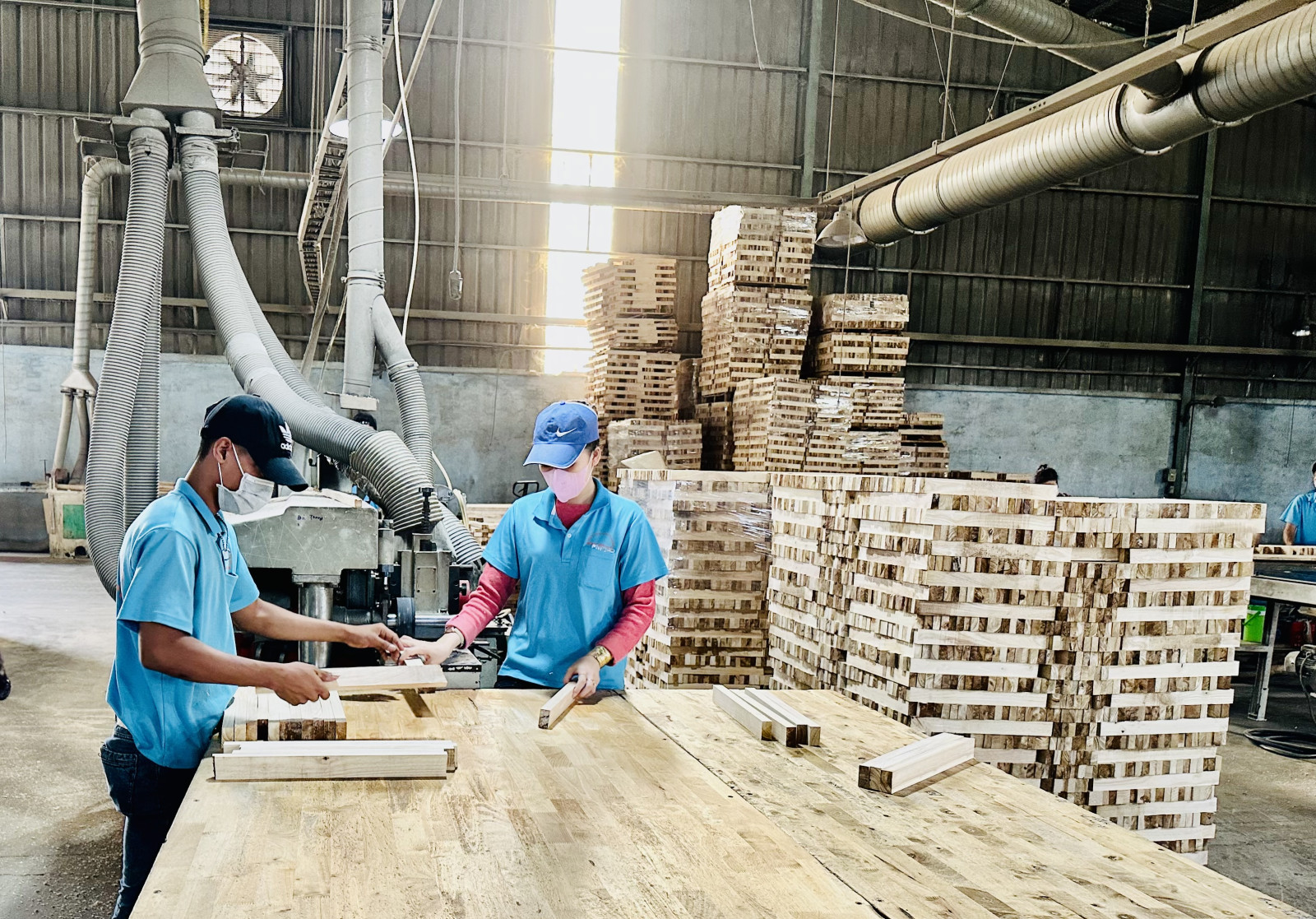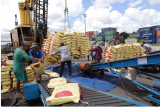Remove policy obstacles and help enterprises overcome difficulties
In a tough economic context, industry associations are looking for ways to save themselves, and at the same time propose that departments have flexible ways to support businesses to overcome difficulties.
Difficult to comply with regulations
Production and business activities of enterprises in the province have shown signs of improvement. Currently, many businesses in fields of textiles, footwear, and wood products have signed orders for production until the first quarter of 2025. However, enterprises still struggle because of some provisions of the law.
According to Nguyen Liem, Chairman of Binh Duong Furniture Association (BIFA), in the first quarter of 2024, their member businesses made great efforts to receive orders, maintain and stabilize production, but there is still many challenges facing the wood industry. The slow recovery and decline in consumer demand from major partners are having a strong impact on domestic production. In addition, there are many major issues affecting businesses in the current context, namely legal regulations.

Wood industry enterprises need to have information about relocation soon to prepare for implementation according to the road map.
According to Nguyen Liem, current regulations on fire prevention and fighting still have some shortcomings, the standards are set too high, and it is very difficult for manufacturing enterprises to meet them. “Renovation to ensure fire prevention and rescue requirements according to regulations is necessary. However, implementing fire prevention and fighting regulations requires a detailed plan, suitable to the actual conditions in Vietnam. It is impossible to completely use advanced techniques from abroad to make standards for Vietnam, because current economic conditions do not allow it. For businesses that have been accepted and put into use, if the inspection is not correct or not guaranteed, there should be remedial measures within a certain period of time. After that time, if they do not comply, there must be sanctions. Only then will we create conditions for businesses to develop," Liem suggested.
Sharing this opinion, Phan Le Diem Trang, Vice President of Provincial Textile and Apparel Association, said: “Over more than 20 years of investment and construction, when legal regulations change, enterprises are also facing big problems regarding the legality of the environment and fire prevention. For example, regarding environment, 20 years ago we only needed environmental records, now we require a wastewater connection. Each enterprise does not have enough resources to connect wastewater on its own. Besides, the policy of relocating businesses to the north of the province is being implemented, we need more favorable conditions to feel secure in production on the basis of the law."
Pham Van Xo, Chairman of the Provincial Import-Export Association, said the import-export situation is still difficult, shipping costs have doubled due to the impact of wars in European countries, and goods circulation activities become more difficult and increase costs. There needs to be diplomatic interventions with foreign logistics services and further development of domestic logistics to reduce freight costs in the near future. In addition, authorities need to control trade fraud to have fair competition in the marketplace, contributing to promoting sustainable economic development.
Need a suitable road map
Nguyen Tien Thanh, Director of Minh Phat Ceramics Company, Chairman of the Provincial Ceramics Association, said that despite experiencing many difficulties, this traditional profession exists and develops. Over time, the industrial nature of this profession becomes higher, the handmade nature has decreased, but the core essence of the ceramic profession is still there. With the enthusiasm and passion of craftsmen, this traditional profession is still maintained, innovated and developed to preserve the cultural and historical values of Binh Duong ceramics. “The arrangement of industrial clusters in Phu Giao to relocate ceramic enterprises as proposed by the association is completely consistent, but there needs to be a bridge during the relocation process so that businesses can have a smooth process of receiving orders, prepare human resources, technology... to stabilize production as soon as possible", Thanh proposed.
He also added that the Provincial Ceramics Association is reviewing the list of enterprises located outside industrial zones and clusters, grasping the thoughts and aspirations, and at the same time proposing and recommending the Steering Committee to implement the relocation project with the most effective solution, both ensuring the implementation of the relocation project and converting functions, while ensuring the maintenance of the traditional ceramic industry, preserving the cultural and historical values of the provincial ceramic industry.
Contributing comments on the plan to implement function conversion and relocation of enterprises located outside industrial zones and clusters in the southern area to industrial zones and clusters in the northern area, Liem said: “It is necessary to soon have a proposed location and support policies for wood enterprises to develop production investment plans. With the characteristics of large-scale production and high specialization, the wood industry needs a large enough production area and a roadmap for businesses to prepare investment resources."
Nguyen Thanh Ha, Deputy Director of Provincial Department of Industry and Trade, affirmed that she will report the recommendations of businesses to Ministry of Industry and Trade and Provincial People's Committee to soon have solutions in the near future, creating favorable conditions for production business and import export.
|
Currently, there are nine industry associations in the province: wood processing, leather, footwear - handbags, textiles and garments, mechanical - electrical, Ceramics, lacquer - sculpture, renewable energy, mineral industry, logistics, import-export. In 2023, Binh Duong province will establish two associations (Mineral Industry and Renewable Energy) to promote industrialization and modernization in the application of green technology and smart factories. However, currently, the use of renewable energy is facing difficulties in connecting to the national power grid because there are still limitations in mechanisms and policies. |
Reported by Tieu My - Translated by Ngoc Huynh
 Bank encourages checking transactions on applications
Bank encourages checking transactions on applications
 Ben Cat concentrates efforts to fulfill socio-economic development targets
Ben Cat concentrates efforts to fulfill socio-economic development targets
 Forstering a logistics center with regional connection
Forstering a logistics center with regional connection
 To clear bottlenecks, make good use of FTAs
To clear bottlenecks, make good use of FTAs
 Vietnam balances supply and demand to prepare for Tet shopping season
Vietnam balances supply and demand to prepare for Tet shopping season
 Developing Bac Tan Uyen district into a town in the period 2030-2040
Developing Bac Tan Uyen district into a town in the period 2030-2040
 Accompanying investors for sustainable development
Accompanying investors for sustainable development
 Tan Uyen: Flexible adaptation, stable growth
Tan Uyen: Flexible adaptation, stable growth
 Tax revenue management boosted and modernized
Tax revenue management boosted and modernized
 To build synchronous infrastructure, facilitate new era development
To build synchronous infrastructure, facilitate new era development







